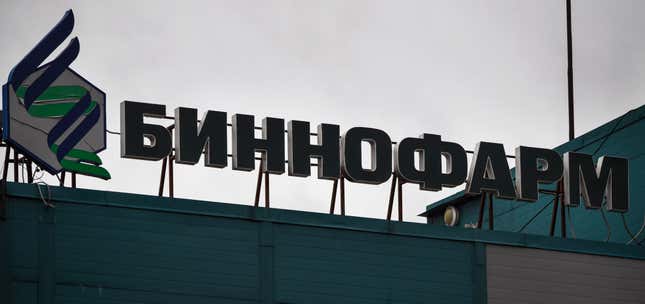
New research released on Friday is the first bit of evidence supporting a vaccine for covid-19 being developed by scientists in Russia. The pair of early clinical trials suggest that the vaccine is safely tolerated and can create an immune response to the coronavirus that causes covid-19 in people. But as with other experimental candidates, it’s still unknown whether the vaccine will actually be effective, despite it already receiving approval by the Russian government.
The research was published in the Lancet, detailing two trials of the vaccine. Dubbed Sputnik V by Russia, the vaccine is a recombinant adenovirus vaccine. These vaccines are made from adenoviruses—a common group of viruses that can cause colds in people—that have been genetically modified to carry a specific piece of the target germ that you want the body to become immunized against, known as an antigen. The virus is neutered so that it shouldn’t cause sickness or replicate in cells, but it’s still able to infect and deliver its germy package to cells, making the cells produce the foreign antigen as a result.
This cell-hijacking usually prompts the immune system into action. The whole process aims to train the immune system to remember whatever other pathogen the adenovirus has been made to mimic (the coronavirus, in this case), thereby preventing or weakening any real infections that could come later.
Sputnik V is loaded with two adenovirus vectors, intended to lessen the risk of an immune response that could make someone sick, according to the researchers. The two trials, involving 38 healthy volunteers each, were a combination Phase I and II study. They tested versions of Sputnik V that were either kept frozen or freeze-dried before use. In the first phase, 9 volunteers were given the vaccine with one or the other adenovirus vectors by itself in order to test for their safety. After the scientists ruled out any serious safety concerns in the first group, they then enrolled 20 more people into Phase II, where the full two-part vaccine was given, with doses 21 days apart. In total, the study was 42 days long. The vaccine was given through injection in the upper arm.
In the trials, neither vaccine seemed linked to any serious adverse effects. The vaccine also appeared to induce an antibody response to the coronavirus, known as SARS-CoV-2, in all of the volunteers, as well as a response from T cells, another important part of the immune system that remembers past infections. Side effects did include fever, fatigue, headache, and pain at the injection site.
The findings suggest that the “vaccine is safe, well tolerated, and induces strong humoral and cellular immune responses in 100% of healthy participants,” the authors wrote.
Having at least some data behind Sputnik V is certainly a good thing, given the complete lack of it up until now. It’s also true that adenovirus-based vaccines have been studied for decades and have been generally found safe to use in people. But they’ve never been very successful past early trials either, with only one vaccine—for Ebola—having earned approval anywhere in the world so far. That makes Russia’s approval of Sputnik V last month, apparently based on this early data, all the more presumptive.
Despite the fanfare by the country in its announcement of Sputnik V, the timeline of when the vaccine could be made available to residents in Russia or elsewhere (countries such as India are in talks to produce and possibly distribute Sputnik V) is still very unclear. Russian has gone ahead with a Phase 3 trial of Sputnik V, typically the last stage of clinical research needed before a treatment or drug receives approval from a government.
As encouraging as this research might be, it’s not still the covid-19 vaccine home run that the world is eagerly awaiting for, at least not yet.